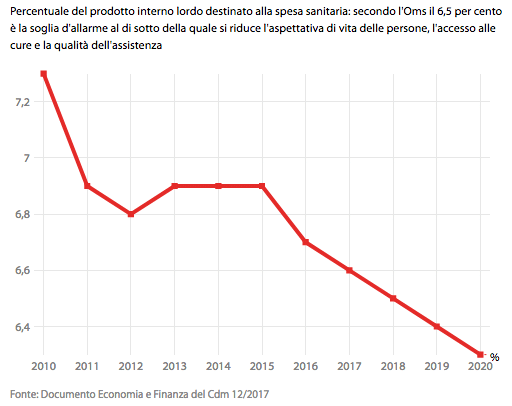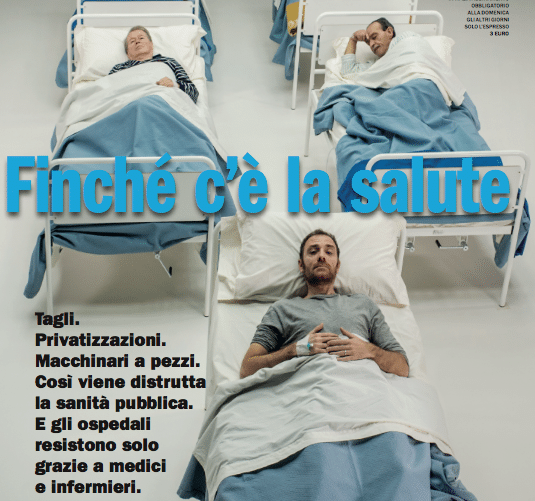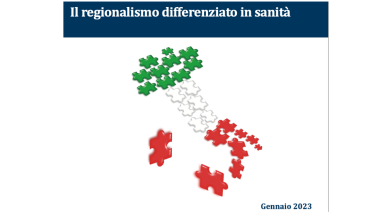
Seventy thousand beds less in ten years. One hundred and seventy-five hospitals closed. Waiting lists longer and longer which increase the private spendingto. And to cure themselves, Italians are making more and more debts in the silence of a policy that is safe from any risk with superpolicies paid for with public money. We tend to reduce more and more the share of investments destined to improve our system. 2015 saw in our country 2.6 million families give up treatment due to lack of resources. A substantial part of the emoluments to parliamentarians is used to cover the registration to thesupplementary health care. Smashing Italian healthcare, or even just telling it as the last of the class, is a strategy that it hides economics interests and a business of billions”. Interests that pass through the policies to private citizens who want to protect themselves from the inefficiency of the public system. Ultimately, it is as if the politicians are doing the dirty work, compressing the ranges of free healthcare services and medicines that can be purchased at no cost by the sick – the authors continue -. The clean work, however, is entrusted to the insurance companies, which have ready the ideal package to meet the needs of anyone who needs care
Salute spa, the new book that tells the story of the "perfect crime" taking place on public health between politics and insurance
The authors, Quezel and Carraro, see the hand of the lobbies behind the progressive decline of public health, justified by the EU's spending review requests: "It is as if politicians were doing the dirty work, compressing the ranges of free health services and medicines that can be purchased at no cost by the sick. The clean job is entrusted to the insurance companies, who have the ideal package ready”
by Fiorina Capozzi – 13 September 2018 – Il Fatto Quotidiano
Seventy thousand beds less in ten years. One hundred and seventy-five hospitals closed. Waiting lists longer and longer which increase the private spending. And to cure themselves, Italians are making more and more debts in the silence of a policy  which is safe from any risk with superpolicies paid for with public money. It is the scenario of Italian healthcare in which the third wheel peeps out: le insurance who see a large market to conquer. The change taking place is epochal and is progressively dismantling the National Health Service created in 1978 to offer assistance to all citizens, as they say Massimo Quezel And Francis Carraro in the book Health spa, out in these hours with Chiarelettere.
which is safe from any risk with superpolicies paid for with public money. It is the scenario of Italian healthcare in which the third wheel peeps out: le insurance who see a large market to conquer. The change taking place is epochal and is progressively dismantling the National Health Service created in 1978 to offer assistance to all citizens, as they say Massimo Quezel And Francis Carraro in the book Health spa, out in these hours with Chiarelettere.
In about 150 pages, the two experts in the sector (Quezel is an out-of-court counsel, Carraro is a lawyer) retrace the stages of a progressive dismantling of the Italian health system and the creating a vacuum that insurance companies prepare to fill, transforming the right to treatment in an area reserved only for those with money to spend. “Between 2007 and 2014, Italy was one of the few advanced nations where healthcare expenditure per capita – already among the lowest – has contracted rather than increased. And that happens because we tend to reduce more and more the share of investments destined to improve our system. From 2009 to 2013, our investments plummeted, having decreased by 30 per cent, while the French and Germans increased the amounts allocated to the health sector by 10 per cent”, write Quezel and Carraro. At the basis of this choice the leitmotif: "We have to reduce debt, we have to manage taxpayers' money better."
THE CUTS THAT HAVE HAPPENED ESPECIALLY TO THE WEAKEST – According to the authors, “the cuts have affected everyone, especially the weaker bands of the population. 2015 saw in our country 2.6 million families give up treatment due to lack of resources. Of these, one million are subject to a catastrophic expenses (i.e. unforeseen and higher than the family income), while 300,000 result impoverished by medical expenses incurred". Not only that: “More than 12 million citizens postponed treatment, or even gave it up, during 2017, due to financial difficulties. The increase, compared to the previous year, is one million and two hundred thousand units”, reads the book where it is highlighted how only in 2017 the institutions specialized in credit disbursed 400 million euros to patients forced to go into debt to secure care. "Two years ago, this sum was 340 million", continue the authors who recall how last year the expenditure incurred by Italians in 2017 for treatment in private facilities was 40 billion euros, while 2 million and 700,000 compatriots preferred to consult a private professional before deciding to undergo therapy. Furthermore, "8 million Italians chose to resort to the loan solution in 2017, in order to access the right mentioned in thearticle 32 of our Constitution – reads in the book – . Only 41 per cent of Italians finance their healthcare needs with their current income, while the vast majority go into debt: 23.3 per cent draw on savings and other sources while 35.6 per cent deal exclusively with sources other than usual income. All this because the waiting lists they are longer and longer, while the need for care requires immediate responses.
THE LIFESAVER OF PARLIAMENTARIANS AT PUBLIC EXPENDITURE – Meanwhile, politics, which is thinking of dismantling the  public health, benefits from an enormous privilege: "A substantial part of the emoluments to parliamentarians is used to cover the enrollment in thesupplementary health care: 526.66 euros per month for deputies and 540.27 for senators, thanks to which they can obtain the free reimbursement of any performance, or almost, including contact lenses. And the guarantees are extended even to relatives and cohabitants – underline Quezel and Carraro -. But how much does it cost us to maintain the health Eden of our representatives? In 2014 the supplementary health insurance funds covered reimbursements for 11 million and 150,000 euros in the House and 6 million and 100,000 euros in the Senate, and still remain active…”
public health, benefits from an enormous privilege: "A substantial part of the emoluments to parliamentarians is used to cover the enrollment in thesupplementary health care: 526.66 euros per month for deputies and 540.27 for senators, thanks to which they can obtain the free reimbursement of any performance, or almost, including contact lenses. And the guarantees are extended even to relatives and cohabitants – underline Quezel and Carraro -. But how much does it cost us to maintain the health Eden of our representatives? In 2014 the supplementary health insurance funds covered reimbursements for 11 million and 150,000 euros in the House and 6 million and 100,000 euros in the Senate, and still remain active…”
Furthermore, the dismantling of health care brings a worsening of health quality of services with the multiplication of errors. The risks increase and the companies refuse to insure hospitals and doctors. "There medical malpractice has become the number one suspect: the evidence against him is so overwhelming that it seems impossible to offer a different answer to the decline in public health - the authors write - But beyond the individual dramas, which deserve the utmost attention, the possible respect and protection, the health system of our country is not as ugly, dirty and bad as it is described to us. The solutions to improve it there would be, and how”.
THE ADVANCE OF INSURANCE LOBBYES – Why does politics not intervene by fixing the  National Health Service? According to the two authors, the reason is that behind the progressive setback of public health, justified by requests for spending reviews of the Union, there is actually the hand of insurance lobbies eager to conquer the health market. “What is happening week after week, unbeknownst to almost everyone except the experts in the sector, and that companies are fleeing an area they deem unprofitable – reads the book -. The banned races from hospital facilities are increasingly deserted. Nobody shows up. But insurance companies don't just run away, far from it. Healthcare is a delicious dish and the table that most interests companies is that of supplementary policies. Smashing Italian healthcare, or even just telling it as the last of the class, is a strategy that it hides economics interests and a business of billions”. Interests that pass through the policies to private citizens who want to protect themselves from the inefficiency of the public system.
National Health Service? According to the two authors, the reason is that behind the progressive setback of public health, justified by requests for spending reviews of the Union, there is actually the hand of insurance lobbies eager to conquer the health market. “What is happening week after week, unbeknownst to almost everyone except the experts in the sector, and that companies are fleeing an area they deem unprofitable – reads the book -. The banned races from hospital facilities are increasingly deserted. Nobody shows up. But insurance companies don't just run away, far from it. Healthcare is a delicious dish and the table that most interests companies is that of supplementary policies. Smashing Italian healthcare, or even just telling it as the last of the class, is a strategy that it hides economics interests and a business of billions”. Interests that pass through the policies to private citizens who want to protect themselves from the inefficiency of the public system.
Some figures may be useful to understand what the market is behind this progressive dismantling of public health aimed at redraw the balance between public and private. Currently “out of 148 billion in health care expenses incurred by Italian citizens, 36 are paid by private individuals. Of these 36, only 15 percent go through health insurance policies or funds  explain Quezel and Carraro -. In short, looking at it from the point of view of companies there is a real one prairie to colonize, made up of that 85 per cent of out-of-pocket spending that is still directly incurred”. The market is therefore large and the conquest by insurance companies is only just beginning. “According to the data provided by theAnia, between 2013 and 2014 the Italians shelled out for the sickness policies 2 billion in premiums, divided among the major competitors in the sector. First of all generals, which declared over 600 million euros out of the 7 billion collected in the non-life business – reads the book -. The other big teams have turned out UnipolSai (with 557 million euros out of a total of 9.7 billion in the non-life business), Rbm Health Insurance (about 184 million), Allianz (always 184 million) and, at the end, Royal Mutual. All realities for which the health sector is preparing to become like the field of gold sequins”.
explain Quezel and Carraro -. In short, looking at it from the point of view of companies there is a real one prairie to colonize, made up of that 85 per cent of out-of-pocket spending that is still directly incurred”. The market is therefore large and the conquest by insurance companies is only just beginning. “According to the data provided by theAnia, between 2013 and 2014 the Italians shelled out for the sickness policies 2 billion in premiums, divided among the major competitors in the sector. First of all generals, which declared over 600 million euros out of the 7 billion collected in the non-life business – reads the book -. The other big teams have turned out UnipolSai (with 557 million euros out of a total of 9.7 billion in the non-life business), Rbm Health Insurance (about 184 million), Allianz (always 184 million) and, at the end, Royal Mutual. All realities for which the health sector is preparing to become like the field of gold sequins”.
THE DIRTY WORK AND THE CLEAN WORK IN THE PERFECT CRIME – Following the leitmotif of the book, the discourse on the interests at stake on public health become clear by showing which game is in full swing: "Ultimately, it is as if the politicians were doing the dirty work, compressing the ranges of free healthcare services and medicines that can be purchased at no cost by the sick – the authors continue -. The clean work, however, is entrusted to the insurance companies, which have ready the ideal package to meet the needs of anyone who needs care. And, it goes without saying, he can afford it”. Thus, estimates on supplementary policies are already circulating: according to the authors, there is talk of 21 million Italians who will have a supplementary policy in 2025. “A scenario is emerging in which, the sprawling expressions of financial capitalism will dominate contemporary they assemble banking functions and insurance functions, with no more internal distinctions or solutions of continuity”, conclude the two experts who define the ongoing game on public health as a real “perfect crime” .
Related news: Austerity, meals and mandatory vaccination: cross-regional analysis of vaccination in Italy 2000–14
Swiss. Containment of health care costs, the insurance companies are happy





